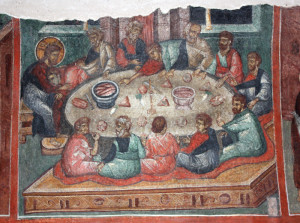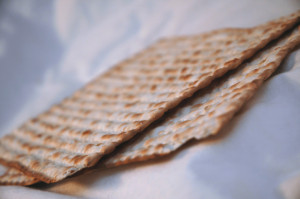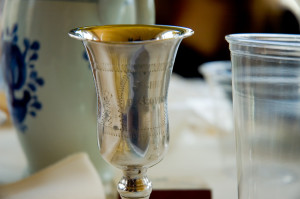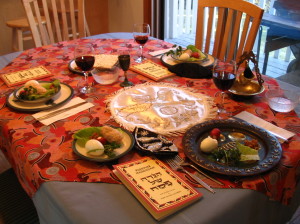“I have earnestly desired to eat this Pesach meal with you before I suffer.â€
Tonight begins the first night of Passover, of Pesach, the Jewish holiday of remembrance and living-out the Israelite escape from Egypt. It is a holiday of questions, of upheaval, of chaos, of suffering and deliverance. And for Christians, also the beginning of a significant spiritual change.
Yeshua pours the wine. Then he lifts up the cup and says the brachah: “Blessed are you, Adonai, our God, king of the universe, who creates the fruit of the vine.†He drinks, then looks up at his disciples. “I will not drink again from the fruit of the vine,†he says, “until God’s kingdom comes.â€
His disciples had the sense that he was going to miraculously overthrow the Romans and usher in a new age of Israeli peace, all in good time. Now they know, “good time” means “real soon now.” A great political upheaval is afoot.
This is Pesach.
He lifts up the bread and says the blessings: “Blessed are you, Adonai, our God, king of the universe, who brings forth bread from the earth. Blessed are you, Adonai, our God, king of the universe, who sanctified us with his commandments, and commanded us concerning the eating of matzah.â€
Then he starts breaking the hard unleavened matzah into pieces, handing them out to the disciples, and says, “This is my body which is given for you. Do this in memory of me.â€
They eat the Pesach feast. And while they’re eating, Yeshua drops another bombshell: “One of you is going to betray me.â€
The disciples stare at each other for a long moment, not knowing what to say, not knowing what to think. One by one, each of them begins to ask, “Surely, you don’t mean me?â€
Which one will accidentally say something stupid, betray him to his political enemies? A political defeat against the Roman empire would almost certainly mean a charge of treason and official execution, possibly for all of them.
He says, “It’s the one who dipped his matzah into the bowl at the same time I did.â€
The traitor eyes Yeshua suspiciously. He wonders whether he has been discovered, whether he’s in trouble, or in danger.
Peter whispers to John, “Ask him who he means.â€
So John leans near to Yeshua’s ear and quietly asks, “Lord, who is it?â€
He whispers back, “It is the one to whom I will give this bread when I have dipped it in the dish.â€
“Is it me?†the traitor whispers, taking the bread.
Yeshua tells him, “What you’re doing, do it quickly.â€
And he leaves to help Yeshua’s political opponents get close enough to arrest him.
This is Pesach.
The other disciples think that it was just business, because one of the traitor’s duties is as the treasurer of their little conspiracy. So they assume Yeshua sent him out on some business or other.
They finish the festive Pesach meal.
Then comes the third of the four Seder cups, the Cup of Redemption, symbol of God purchasing their freedom from slavery. “I will redeem you with an outstretched arm and with mighty acts of judgment.†Because he passed through the land of Egypt, and killed all their firstborn. He executed judgment against the gods of Egypt. God purchased Israel’s freedom, bought them as slaves, for a price.
Yeshua pours the wine. He lifts the cup, says the brachah, and then adds, “This cup is the new covenant in my blood, which is poured out for you. I am the price of redemption.â€
Afterward, he prays late into the night, while his disciples wait. “Father, if you are willing, remove this cup from me. Nevertheless, not my will, but yours, be done.â€
Then betrayal, arrest, condemnation, execution. And resurrection—
This is Pesach.
In the modern Seder, bread is broken at several points. At Yeshua’s last Seder, the Temple was still standing, so the breaking of bread in the Gospel stories is probably the main blessing over the bread, before the meal. But in one of the rituals added after the destruction of the Second Temple, three matzot, which have been stacked one on top of the other and covered with a cloth, are uncovered. The leader takes the middle of the three, and breaks it in two pieces. The larger of the pieces is called the “afikomen.†He wraps the afikomen up in a napkin and hides it away until the end of the Seder. At that time, the children find it, and he “redeems†it from them, for a price. This broken matzah, the Talmud notes, is symbolic of the Paschal lamb, which the Jews were unable to sacrifice without the Temple. But no one really knows where the ritual comes from, or why it is hidden away and then later redeemed. It’s an open question.
This is Pesach.
This is the beginning of the Counting of the Omer, the 49 days between Passover and Pentecost, the journey from Egypt to Sinai, from slavery to freedom, from chaos to fulfillment.
(Adapted from Walking in the Moment between Tick and Tock: From Passover to Pentecost.)




Your article sums up or outlines nicely what Rabbi Nathan shared last Saturday in Norfolk. Thanx